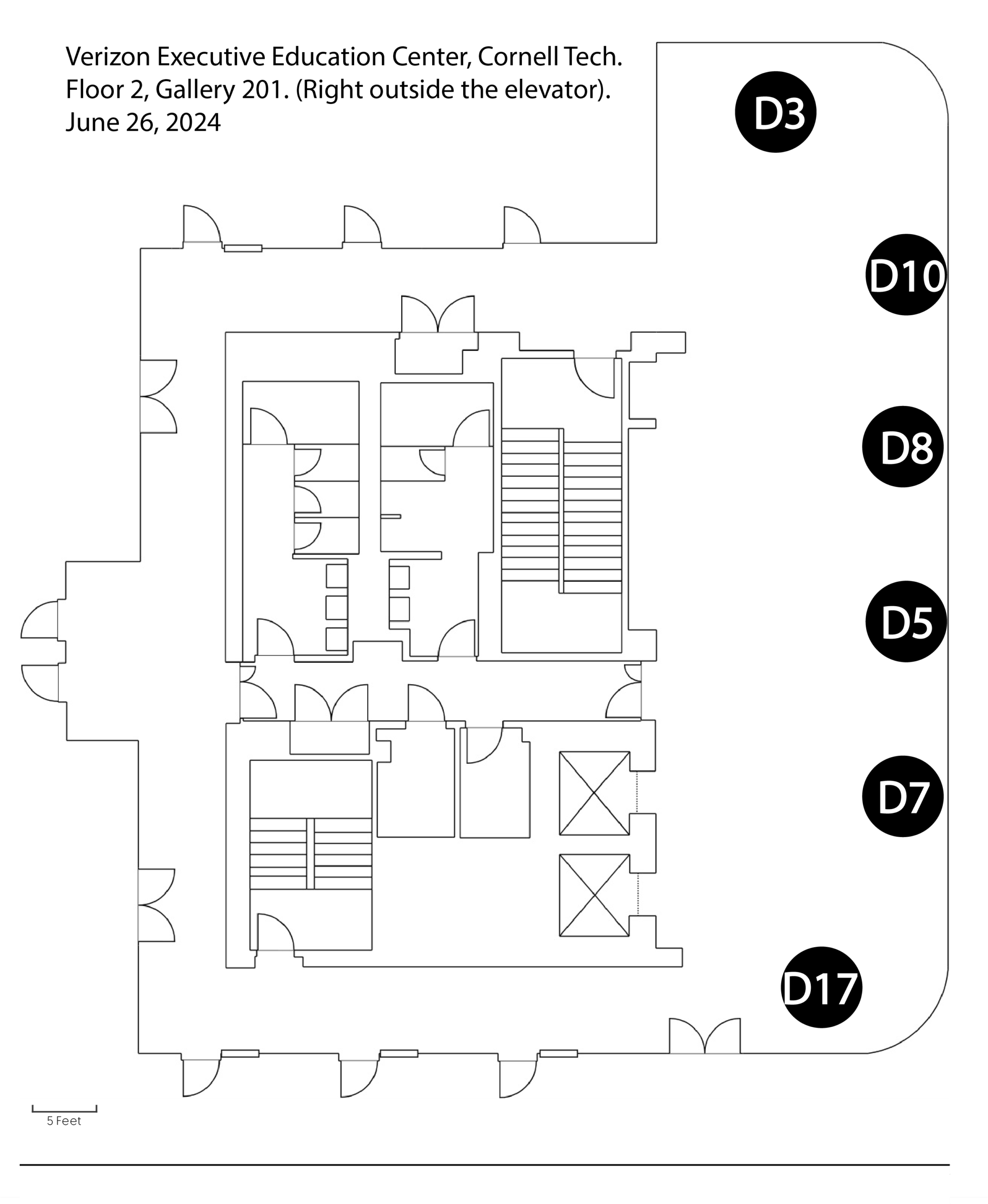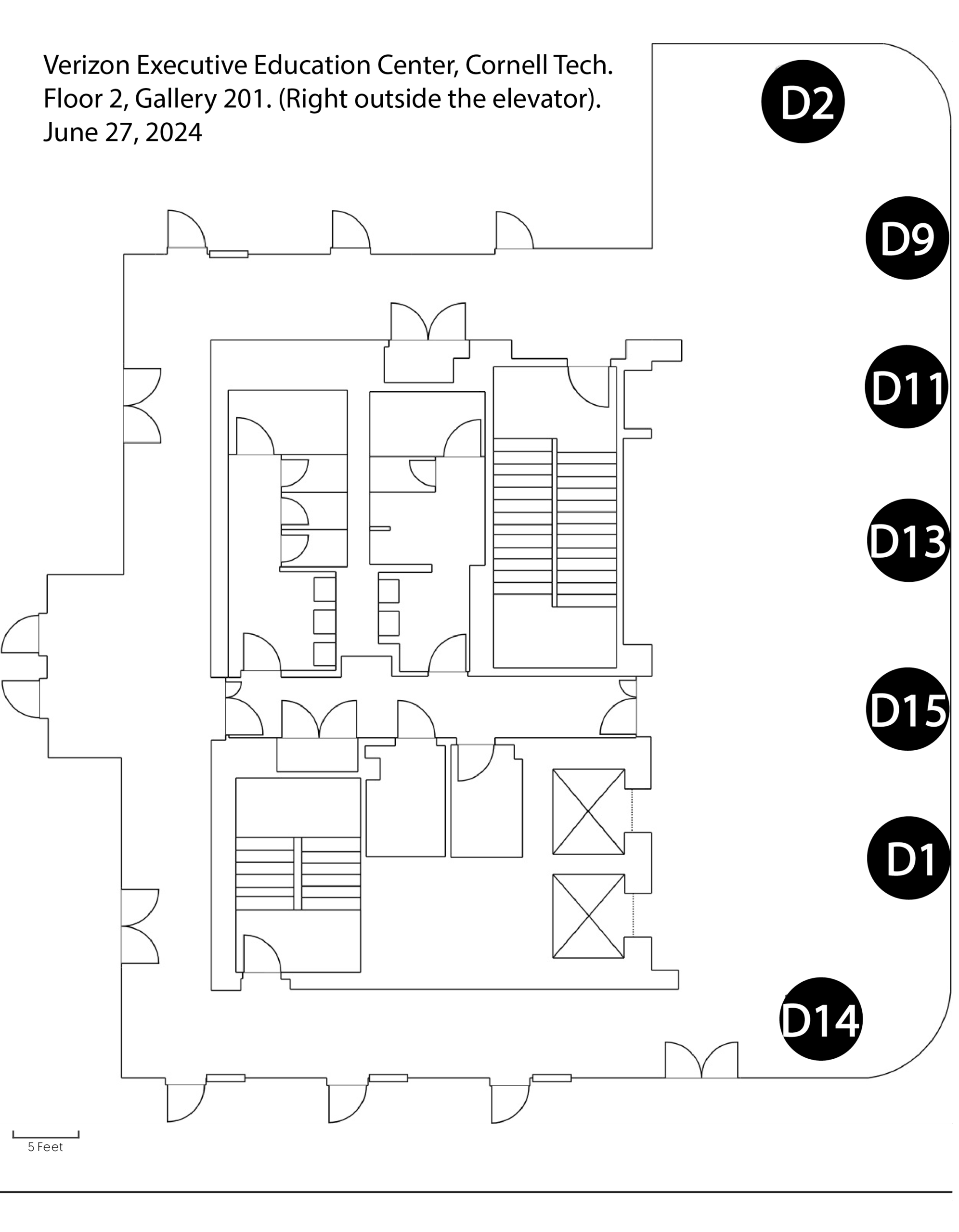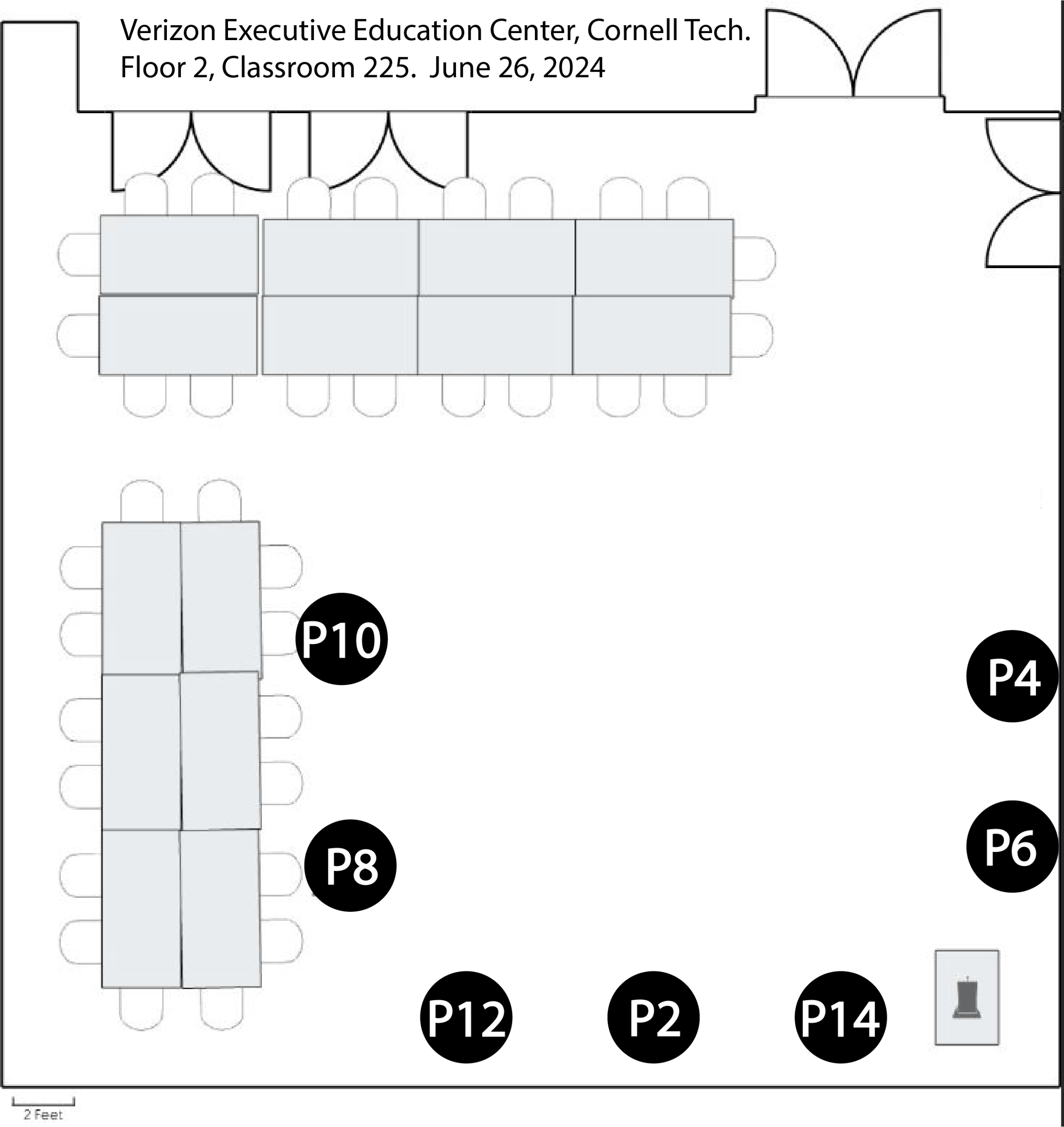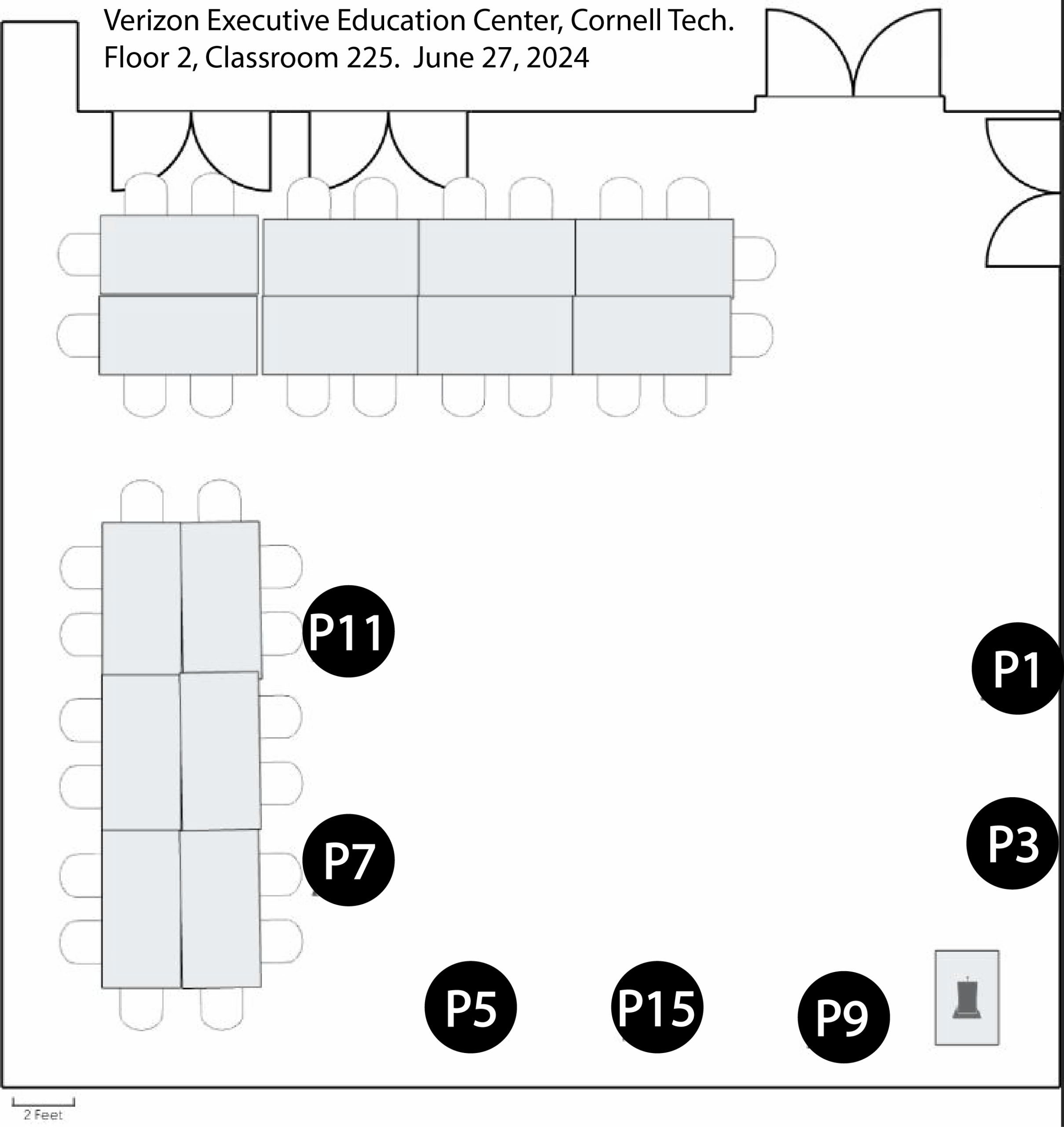2025 XR Access Symposium
July 26-27, 2025 | In-person Event
At the 2025 XR Access Symposium, we reviewed the state of the XR field, celebrated a year of progress toward accessibility, and took steps toward a more inclusive future. Thank you for joining us!
This page contains links to the posters and demos from those exhibitors that agreed to share their work publicly. If you are an exhibitor and would like to provide a link to the work listed here, please email info@xraccess.org.
Accessible XR Demos
These demos showcase work from research teams and companies creating the latest in accessible XR technology, or using XR to make the world more accessible. Questions about a demo?
You can find the demo presenters on Slack or during the afternoon break (1:10-2:40pm) on Day 1 and during the snack break (10:10-11:40am) on Day 2.
Demos Location
See Table down below for Legend.
Thursday, 26th of June

Friday, 27th of June

| Demo Title | Author | Description | Day | Map Identifier |
|---|---|---|---|---|
| Aesthetic Access for VR: Centering Disabled Artistry | Kiira Benz & Alice Sheppard, Double Eye Studios & Kinetic Light | Attendees will step into “territory,” an equitably accessible PC-VR experience that pairs narrative haptics (Meta Haptics Studio) with music, audio description, and artistic closed captions, showcasing ground-breaking aesthetic access from pre-production through virtual world-building. | Thursday, 26 June 2025 Friday, 27 June 2025 |
D5 and D14 |
| AI Advancement in Wearable and MR Technology | Agustya Mehta & Matthew Bambach, Meta | Attendees will explore Meta prototypes highlighting new AI-powered features in wearables and mixed-reality headsets, illustrating how these advances translate to AR and drive accessible XR experiences for all. | Friday, 27 June 2025 | D15 |
| Customize Accessibility on Apple Vision Pro | Rob Dietz, Weill Cornell Medicine | This demo invites attendees to experiment with Vision Pro voice commands, eye/hand tracking, Siri shortcuts, and head-mounted capture, showing how built-in tools can be pushed further to accomplish complex tasks with simpler input. | Thursday, 26 June 2025 | D7 |
| Designing for Local Community Issues Using AR Rapid Prototyping and Ideation | Daniel Enriquez, Cornell Tech | An AR application lets attendees freely place sketch-ups over real locations, creating high-contrast navigational cues on the fly and enabling low-vision users to augment physical space without permanent modification. | Friday, 27 June 2025 | D13 |
| Echosense: Virtual Navigation through Spatial Audio & Echolocation | Connor Pugh, Jake Araujo-Simon, Rajshri Jain, and Rhythm Raghuwanshi, Cornell Tech | Attendees can navigate a virtual scene as Echosense converts sonar-style scans and geometry processing into rich spatial audio, conveying fundamental geometric information directly via sound. | Friday, 27 June 2025 | D9 |
| EnVisionVR: A Scene Interpretation Tool for Visual Accessibility in Virtual Reality | Junlong Chen & Vanja Garaj, University of Cambridge / Brunel Design School | Attendees will use voice input with a Vision Language Model and multimodal feedback to interpret VR scenes and locate virtual objects, demonstrating a novel accessibility pipeline for BLV users. | Thursday, 26 June 2025 | D3 |
| Exploring VR for Emotional Self-Regulation in a Disabled Community | Jesús Eduardo Russián, University of the West of Scotland | Two side-by-side stations let attendees compare a calming 360° nature video with an interactive VR game, examining how each approach supports emotional self-regulation and accessibility. | Friday, 27 June 2025 | D11 |
| Hands-on InclusiveVR@Work: Demonstrating Customizable Virtual Workspaces for Accessibility | Julia Anken, Karlsruhe Institute of Technology | Attendees will build individualized VR workspaces with flexible input, multi-monitor layouts, focus modes, and adjustable color, contrast, magnifier, lighting, and ambience, showcasing collaborative virtual environments tailored to each user. | Friday, 27 June 2025 | D2 |
| Inclusive VR Card Deck | Shiyun “Joanne” Tang, New York University | In this interactive card game, attendees draw Accessibility Challenge and AI Tools cards to brainstorm inclusive VR strategies, turning complex 3D ideation into approachable 2D solutions while sparking fresh ideas for inclusive design. | Friday, 27 June 2025 | D1 |
| Lemmings: Tools for Accessible Gestures – BEST DEMO WINNER | Justin Berry, Yale University | Live Unity scenes show how complex gestures are decomposed into a few tracked features, letting attendees remap actions—like a pinch to a head turn—advancing gesture and motion-powered interaction for accessibility. | Thursday, 26 June 2025 | D17 |
| MapIO: A Gestural and Conversational Interface for Tactile Maps | James M. Coughlan, Smith-Kettlewell Eye Research Institute | Attendees point to tactile map features and ask verbal questions; a camera tracks finger location, queries an LLM, and provides audio answers plus real-time step-by-step guidance. | Thursday, 26 June 2025 | D8 |
| Virtual Reality Interventions for Intersectional Stress Reduction Among Black Women | Judite Blanc, University of Miami Miller School of Medicine | Attendees can experience excerpts from NurtureVR™ and First Resort, sampling mindfulness, relaxation, and blood-pressure-management activities designed to address intersectional stressors and highlight VR’s escapism benefits. | Thursday, 26 June 2025 | D10 |
| Accessibility Innovations for Extended Reality Drama and Documentary | Sacha Wares, Trial and Error Studio | Sacha Wares, a leader in the field of directing for extended reality, will discuss two recent projects in which the editorial themes and novel formats demanded XR accessibility innovations. Museum of Austerity is a mixed reality exhibition exploring links between the deaths of disabled people and changes to the UK benefit system. | Thursday, 26 June 2025 Friday, 27 June 2025 |
D18 |
Accessibility and XR – Posters
These research and industry posters showcase studies conducted from research teams and companies creating the latest in accessible XR technology, or using XR to make the world more accessible.
Questions about a poster?
You can find the poster presenters on Slack or during the afternoon break (1:10-2:40pm) on Day 1 and during the snack break (10:10-11:40am) on Day 2.
Posters Location
See Table down below for Legend.
Thursday, 26th of June

Friday, 27th of June

| Poster Title | Author | Description | Day | Map Identifier |
|---|---|---|---|---|
| Accessibility and Neurodiversity in XR | Logan Ashbaugh, California State University San Bernardino | Building on a disability-design literature review, this poster shares collaboratively refined guidelines for creating XR applications that address the needs of neurodivergent users. | Friday, 27 June 2025 | P7 |
| Assembly and Expression in XR: Transposing Human Rights Across Realities | Emmie Hine, Yale Digital Ethics Center | Through case studies of virtual protests, art, and public discourse, the poster proposes a rights-protection framework that weighs embodiment levels and public-function doctrine to help platforms uphold assembly and expression for marginalized groups in XR. | Thursday, 26 June 2025 | P2 |
| Designing AI-Avatars to support young adults in emotion and positive self-talk | Ann-Kareen Gedeus, Cornell University & Cornell Tech | Participatory design sessions with therapists and young adults refine verbal and non-verbal AI-avatar behaviors, laying groundwork for a mobile app that pairs avatars with calming XR scenes to encourage positive self-talk. | Friday, 27 June 2025 | P9 |
| Empowering Inclusive Care: An Immersive VR Training Program for Neurodiverse Patient Interactions – BEST POSTER WINNER | Lynn Xu & Chelsea Twan, NYU Langone Health | Details a Meta Quest 3 prototype that places clinicians inside sensory-rich exam scenarios co-designed with autistic and ADHD self-advocates. Motion-tracking and haptic cues highlight body language, while pre- and post-surveys chart gains in empathy, bias reduction, and communication confidence. | Thursday, 26 June 2025 | P10 |
| Enhancing Learning Platforms for Individuals with ADHD in XR Education | Veronica Pimenova, Carnegie Mellon University | Building on a controlled study where segmented videos lowered errors and hesitations, this poster shows how “pause-and-chunk” pacing, micro-goals, and lightweight progress cues can be embedded in XR lessons to tame cognitive load for ADHD learners. | Friday, 27 June 2025 | P3 |
| Exploring Reading in Augmented Reality for People with Dementia | Rupsha Mutsuddi, York University | Mixed-reality prototypes add contextual audio prompts and enlarged, glance-able text to everyday reading. This poster shows how field sessions with adults in early-stage dementia surface design rules for cognitively accessible MR, such as limited menus, gentle animations, and easy exits. | Friday, 27 June 2025 | P11 |
| Exploring Virtual Reality to Mitigate Visual Split in Computer Science Education for Deaf and Hard of Hearing Classrooms | Shuxu Huffman, Gallaudet University | The poster compares Transparent, Parallel, and Corner signer placements in a 15-minute ASL “binary search” lecture. Results show VR reduces attention-split and eye-strain, pointing toward signer-aware layouts for inclusive STEM instruction. | Friday, 27 June 2025 | P5 |
| Good Intentions, Real Barriers: Investigating Accessibility in XR Workflows | Mrunmai Abhyankar, XR Access | Interviews with XR devs and testers reveal that existing guidelines are “too scattered.” The poster presents a prototype information-architecture that groups checkpoints by build phase and impairment domain, making best practices more searchable and actionable. | Thursday, 26 June 2025 | P6 |
| Inclusive Immersion: Accessible AR and VR for High School Education in Controlled Environment Agriculture | Maryam Bigonah, Auburn University | A web-based greenhouse simulator merges stochastic crop models with Universal Design for Learning. The poster demos haptic-ready Accessible VR and screen-reader-friendly AR views that let all students practice sustainable farming decisions. | Friday, 27 June 2025 | P1 |
| INDYvr: Towards an Ergonomics-based Framework for Inclusive and Dynamic Personalizations of Virtual Reality Environments | Raquel T. Cabrera-Araya, Texas A&M University | Six linked modules capture reachability and walkability metrics, then reposition objects and adjust architecture in real time for diverse physical abilities. The poster visualizes how parametric rules reposition items in real time for shorter, wheelchair, or limited-reach users. | Thursday, 26 June 2025 | P8 |
| Resilient Realities: A Deep Dive into the VR Journeys of People with Disabilities | Divya Laxman Bhadargade & Sanchay Murugan, Iowa State University | This poster explores the motivations and goals of individuals with physical and cognitive conditions when using immersive technologies. Diary studies and contextual interviews document in-context XR use and surface barriers that shape “adapt and ignore” coping tactics, offering concrete recommendations for future inclusive XR development. | Friday, 27 June 2025 | P15 |
| Virtual Reality-Based Sensory Motor Rehabilitation Process | Dinesh Bhathad | The poster introduces a VR rehabilitation model in which stroke survivors trace a therapist’s finger movements and stack virtual boxes. Mobility changes are quantified against baseline values, giving patients convenient at-home therapy and data-driven motivation to keep exercising. | Thursday, 26 June 2025 | P4 |
| XR-Enabled Clinics: Advancing Healthcare Access for Rural Communities Through Telehealth & Rehabilitation | Emily Lin & Sarah Canlas, University of Michigan | This poster describes a Community Health Hub pilot in rural Michigan that layers XR, telehealth, digital-literacy workshops, and participatory design to create a scalable model for rural digital health equity in broadband-enabled regions. | Thursday, 26 June 2025 | P14 |